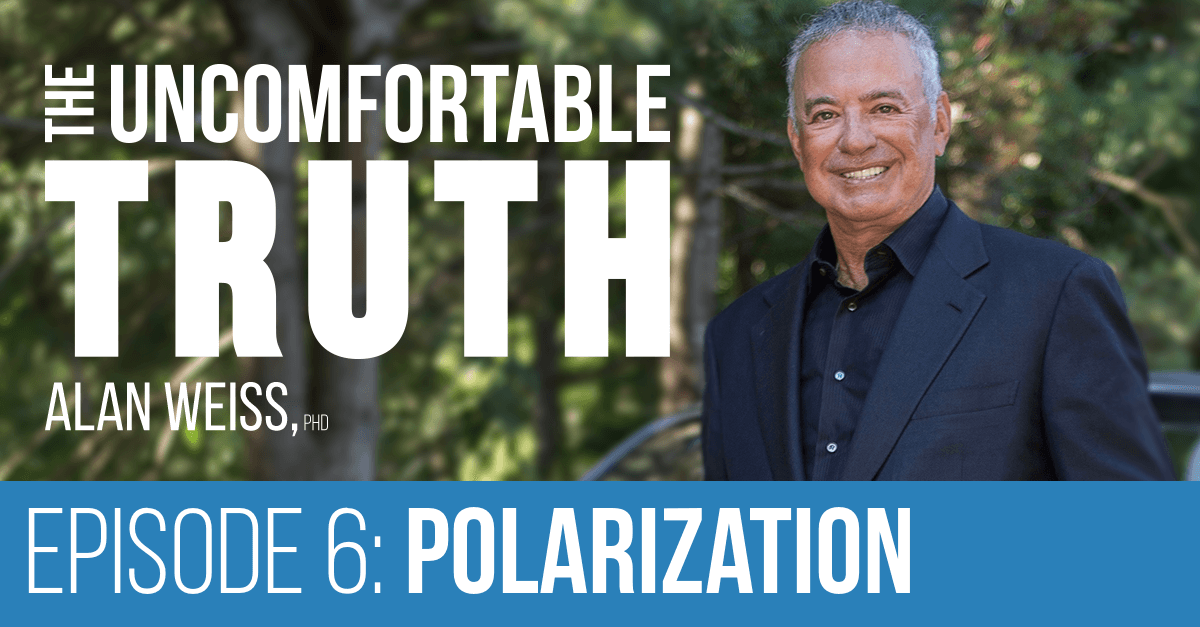
Episode 6: Polarization
The vast, ignorant error in believing people who disagree with you are stupid.
Transcript:
I’m Alan Weiss, and this is my podcast on Polarization. Let me start you with something unusual, a contrarian idea, but I think that polarization is basically the fear of another idea. It’s the fear of some other idea, which causes people to set up barricades and blockages and lower the shields. After all, if you’re really right, what’s to fear?
We’ve become obsessed with belief and not truth. I remember there was an actual MENSA special interest group in the Loch Ness monster. The chairman was in San Francisco, only in MENSA. Some years ago, the guy who created the classic photograph of Nellie the Loch Ness monster, admitted on his deathbed that it was a trick. It was a rouse. He showed the camera and the toys he used to create the false photo. I wrote to this guy and I said to him, “What are you gonna do now? How are you gonna disband?” The guy said to me, that, “It was clearly a set up by the government. It was a conspiracy. They were using this man, but it could never have happened that way,” but that’s because the truth did not fit his belief system.
We see that unfortunately, all the time. We tend to absolutely dismiss opposing views. I questioned someone who was an avid, almost a rabid believer in climate change, which is totally caused by human kind, and I confronted her with some scientists who believed otherwise. She wouldn’t even consider the other opinion. She simply labeled me a denier and ended the conversation. That’s not exactly open to reason, is it? That’s why you have polarization. You’re either with me or you’re against me. If you’re with me, you’re right. If you’re against me, you’re wrong. So we put labels on people, the alt right, the bleeding heart liberal, the war on women, and so forth and so on, rather than face what’s actually happening. Remember the war on terror? F. Scott Fitzgerald said that, “Intellect means the ability to hold two opposing views in your mind at the same time.” We’ve become fearful and threatened. We’re insecure. Polarized people can’t listen. They can’t hear. It’s like the shields that were deployed on the Starship Enterprise. They can talk, and they’ll talk a blue streak, but they won’t listen.
Polarized people, generally, only talk and listen to like-minded people. If you’re for us or you’re against us, there’s no room for confusion, is there? There’s also no room for conversion. The occupy movement (remember Occupy Wall Street?), failed as do most of these kinds of initiatives, most of these kinds of movements, because you have to leave room for discussion. You can’t simply scream and yell and shout. So the famous, liberal students of Brown University, shouting down people with whom they disagree, is a classic case of anti-intellectualism and this is supposedly an intellectual institution, but it’s one that’s polarized.
In organizations, you’re with us or you’re against us in terms of sales and RND, or human resource and almost anything else. Sports fans are polarized. They only believe in their own heroes. Religions are polarized. They only believe in their own God. Politics is polarized. They only believe in their own candidate. Social issues are polarized. You have to be for it or against it. I have to tell you, that sometimes those involve some pretty strange decisions. I’m not quite sure, for example, how one is against abortion, but for capital punishment. Now maybe you can explain it to me, and I’m willing to listen. I just haven’t heard a cogent argument about that yet.
All this though is the tip of the iceberg because beneath is a history of disagreement and certitude. The surface, non-connections, the surface lack of policy, of civility is really just the indicator of the larger iceberg below, where it’s almost impossible to create accurate and fair conversation because people fear changing position. This tremendous normative pressure by their fellow believers not to change. Years ago at one of my thought leadership conferences I had Margaret Wheatley, who wrote “Leadership of the New Science.” She and I are contemporaries, we had some of the same clients, knew some of the same people, grew up at the same time. She is relentlessly pessimistic. I mean, she could make a bird stop tweeting, she is so pessimistic. She actually said to my group, “Only talk to people who agree with you. It’s senseless to talk to anyone else.” Now, she was a 60s activist, and a failed one. Her causes did not eventuate. This is her attitude today. It’s pretty pathetic, no it’s very pathetic.
There’s a dread of admitting we were wrong, and there’s an inability to violate this belief system we carry, even when we’re faced with truths that show it to be inaccurate. Belief trumps truth. This, of course, flies in the face of rationality. Look at Copernicus and the church. Copernicus showed that the Ptolemaic belief system, the ancient Ptolemaic belief system of everything revolving around the earth was wrong. Copernicus said, “It doesn’t work that way, we’re revolving around the sun.” Well, that flew in the face of the church beliefs. It was scientific, he could prove it, and it didn’t matter.
The House Un-American Activities Committee, HUAC, under Joe McCarthy, and Cullen, and the rest, and their approach to communism. McCarthy just had to hold in his hand what were purposeless, pointless, and almost empty, for that matter, sheets of paper and say, “I have here the list of 500 communists we know are members of the United States,” this and that, the media, the Congress, you name it. That’s what people wanted to believe. They wanted to believe that interning Japanese citizens during World War Two made sense, despite the truth that they were loyal and faithful Americans, and many Japanese men fought with heroism and distinction in Europe.
People today find that they don’t think it’s a smart idea to vaccinate their kids for measles. That borders on the crazy because there is no scientific evidence linking vaccination with autism, none, zero. That’s not to say that some kids who’ve been vaccinated haven’t gotten ill, but the percentages are so minute, so small, that it could be attributable to almost anything, and still doesn’t represent reason of the general population to change. Putting kids who aren’t vaccinated in schools with kids who are is very, very dangerous.
Sustaining the Holocaust in World War Two in Germany was another indication of people wanting to believe one thing in the face of the actual truths. Even the American government and American people and others wanted to believe in one thing irrespective of the actual truths that they could see. You can add to this racism and ageism and sexism and gender bias and so forth.
We have certain beliefs, and the truths don’t change those beliefs. I’ll tell you three things about truths and beliefs. The first thing is this. They are both congruent that, for example, the earth revolves around the sun, or you can have an unbelieved truth, eating won’t cause cramps when swimming, or you can have an untruthful belief, people can read minds. So in the first case when truth and belief is congruent, the earth revolves around the sun, and we can act based on that truth and belief. In the second condition, we have an unbelieved truth, that is eating won’t cause cramps when swimming, it won’t, but people still stay out of the water for an hour, and some still do. In the third condition, we have an untruthful belief, that people can read minds, yet people like Uri Geller, who claimed he could bend spoons and so forth, were complete frauds, but people wanted to believe in them.
Just like these quasi-religious, semi-religious, claimed religious guys in the tents who claimed to cure people or know what’s on their mind because they’ve had assistants who have talked to them beforehand and relayed the information via an earpiece. Charlestons. We believe, for example, that a sufficiency of people believe that we hear these things, that the government keeps aliens from us, that they’re on ice in locker 22 or hanger 22 or resort number 3 in who knows what airbase. We believe that we can win at the casinos. You can entertain yourself at the casino, and you can win briefly, but not in the long haul you can’t. We believe we can text and use a phone and drive all at the same time. You can’t, it’s dangerous even if you survive that particular trip. We believe we can steal and cheat. People try it regularly on their taxes. They try it with their friends and colleagues. They think it’s okay. They think that they operate on a different sort of plane from others. It’s okay for them.
People think they should feel guilty, and that dampens talent. It’s a horrible belief system. There’s no reason why you have to feel guilty. People believe they should fear the unknown, they should fear the next day. They believe they have no control. People believe they’re not worthy, a very dangerous belief, but not true unless they allow it to be. Beliefs become truths, it’s very dangerous. It creates polarization with others and polarization in our own minds. I’m this and not that. So what do we do?
Number one, examine our own beliefs in solitude. How has the world changed? What do those changes mean for my belief system? Right now, we have a global world. Right now, we have an instantaneously communicating world. Right now, we have a world of immediate gratification, instant broadcasting, personal broadcasting. Have there been truths that I’ve ignored, and I need to look at things differently? For me, for example, personally, my views on abortion have changed and on capital punishment have changed and on assisted suicide have changed. They’ve changed because I’ve listened to reason in my mind, and I’ve examined my own beliefs and why I have them. I thought I should change my positions, there’s nothing wrong with that. There’s nothing wrong if you disagree with me. What is wrong is we don’t examine them at all.
Number two, examine our own beliefs with empathetic others. Let’s challenge each other. Let’s ask ourselves why we believe what we do. Ask each other to whom else should we be listening, other than our own mad shouting, you know? There’s a famous line, I think it’s famous, from a book by Morris West, I think it was called The Navigator, and he says, “The problem with the high place is that you don’t know if the sound you hear is the voice of God or only the echo of your own mad shouting.” Finally, we’re just breathing our own exhaust. If we don’t talk to others, we tend to breathe our own exhaust as a woman at Hewlett-Packard once explained to me, that’s not healthy.
Number three, engage with others, hear the other side. Not only people with whom you’re empathetic, but truly engage with others. Try to hear what they have to say. Create rules of engagement, you talk, I’ll listen. Then, I’ll talk, you listen, then compare notes. Let’s not shout each other down. Let’s not quote things that aren’t true. Let’s challenge each other on things we believe are beliefs, but not truths and vice versa. Let’s focus on fact and not opinion. Let’s focus on issues and not personalities. That’s the most important thing, avoiding ad hominem attacks.
Number four, join in non-polarized discussion and debate. Don’t preach to the choir, or for that matter, merely sit in the choir. Don’t be like Margaret Wheatley. Join in non-related discussions. You don’t have to have personal debates. You can have virtual debates. No debate justifies nastiness, not at all. I remember meeting a woman before this last election who was ardently and rabidly, liberal democratic and pro-Hillary Clinton. Now, there’s nothing wrong with that, except if you tried to talk to her about another point of view, she would get up and leave the table. One day she got up and left the table and left me with the check. I was paying for the meal, and she just got up, she didn’t thank me, she didn’t finish her food, she just left. I understand she’s changed her doctor because she’s heard two doctor assistants talking about politics she didn’t agree with and told the doctor it should be forbidden. He reminded her about free speech, and so she left for another doctor, hopefully not one in some foreign country.
That kind of attitude, that kind of personal attack and taking things personally doesn’t work. Ask if you’re learning or just yelling. If you abandon things and just walk out, you’re no intellectual. I remember on this show The View once, which is not exactly an intellectual show, Joy Behar, who’s a comedian who seems to think she can debate things seriously, was listening to someone with another point of view and she got up and walked off. It’s too bad she didn’t keep going.
Number five, appreciate the proper priorities. Just because somebody has another view doesn’t mean it’s the end of the world. It doesn’t mean it’s a blow to your self-esteem if you can’t convince them. All this is about your own growth and health. So what do we do?
Five things: examine our own beliefs in solitude so we can come to grips with them. Examine our own beliefs with empathetic others who are easy to work with. Engage others who hold the other side who might not be easy to work with, but who agree to certain rules or agreement, and with whom you can learn and help to learn. Number four, join in the non-polarized discussions and debate. Don’t just try to debate those who believe something radically different. Talk to those who believe something slightly different. Then, appreciate the proper priorities. Put things in perspective. Too many people walking around as if their heads are going to explode, and those most adamant about striking at others will wind up killing themselves.







Kerry L
Great insight and wisdom. Oh how the world needs a bit more of this approach, okay a lot more………..
Thanks
Brandon
Very well written, Alan. As the old saying goes “sometimes the truth hurts” (paraphrasing of course). You hit the nail on the head when you said “We have certain beliefs, and the truths don’t change those beliefs” No matter how much it’s inferred, it’s hard to change that belief.